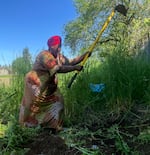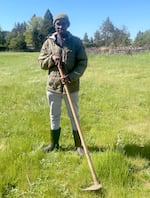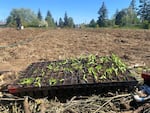
Anne-Marie Urukundo, the African Communities Coordinator for Outgrowing Hunger, clears brush and tills land at a garden project for African refugee growers in May 2023.
Jenn Chávez / OPB
On a warm May morning, in a big East Portland field near a Fred Meyer grocery store, several growers were hard at work tilling the land. These plots of garden land will soon be planted with fresh potatoes, greens, beans, peppers and more. The nine growers on this land are all refugees of African descent: from Rwanda, Burundi or the Democratic Republic of Congo. One of them, Fidele Munyanganizi, was busy with a garden hoe, tilling a piece of land in the shade before the day got too hot.
Munyanganizi was born in the Democratic Republic of Congo, but escaped and lived for many years as a refugee in Rwanda, before migrating to Portland five and a half years ago. Among the many things to adjust to in his new home: the food.
“The first day I came here, we were scared when getting to see the food, because the food looked a little bit different,” he said through an interpreter. “Even the kids, when we went to the store to get things, [were] wondering, what kind of food is this?”
He and his family slowly grew to like American food. But some foods just don’t compare to their African counterparts.
“The African maize compared to what I get to see here … the one here, it’s too sweet,” he said. “The one from Africa is normally really hard, and that one is a better type of corn. … The one that we have here is too flimsy, and we really don’t like it. It’s not tasty.”
But Munyanganizi got to thinking, after he did some work helping cultivate land when he first came to the U.S.: What if he could grow his own maize and other African foods here in Portland?
“Getting to see that there was so much vast land,” he said, “I was asking myself, ‘How can I get to have even just a piece of land, so that I can be able to also grow things?’”
Related: Mudbone Grown reimagines Black farming in Oregon 🥦
The land that Munyanganizi is growing on now is owned by Portland Parks and Recreation and licensed to the local organization Outgrowing Hunger for this garden project. The organization works with refugees in Oregon from around the world: not just African growers, but Bhutanese, Nepali, Burmese, Hmong, Ukrainian growers and more.
“It was really the refugees who found us,” said Adam Kohl, the group’s executive director. “Through time and relationships, [they] were able to articulate the need that they had, which was, ‘We can’t find the food that we like to eat.’”
At Outgrowing Hunger’s local community gardens, refugee growers have the space to grow the cultural foods they grew up growing and eating themselves. Many, like Munyanganizi, draw from deep roots farming these foods in their countries of origin.
“Growing up, I saw my dad farming, my mom, my uncles,” he said. “This is an ancestral thing. I know that I eat good, fresh food.”

Fidele Munyanganizi, a Congolese refugee, is one of nine growers at an Outgrowing Hunger garden project for African refugee growers in East Portland.
Jenn Chávez / OPB
Dr. Lisa Price, a professor of anthropology at Oregon State University who studies food systems, said it’s globally recognized that cultural foods go hand in hand with food security and intangible cultural heritage.
“Without food and food culture, we miss a vital element to being human,” she said.
Access to cultural foods and food practices (like growing, cooking and sharing them) are easily disrupted by migration and dislocation.
Younger refugees sometimes face social pressure to Americanize their diets, said Kohl from Outgrowing Hunger. Plus, he said, many traditional diets from around the world are heavily plant-based and feature a great diversity of fresh foods with distinct nutritional benefits, but these important foods often aren’t available at big American grocery stores.
“All of that is lost as soon as you start buying your groceries at the local grocery store, because you got lettuce, you got spinach, you got cabbage, maybe some broccoli. You can count on two hands the total number of crop types,” he said. “Whereas there are dozens and dozens of types of vegetables in traditional cuisine which are lost, they’re just lost, if they’re not maintained and actively grown.”
Price said language barriers, lack of familiarity with or trust in local foods, and other factors present challenges to navigating local foodways.
“When we talk about immigrant populations, we also have to talk about income level and where these communities are located. Access to land to garden, as well as seeds to start gardening for traditional foods,” she said. “Local transport to a place where they can acquire traditional food items may be far away. Even having a garden, for example, a community garden: How far away is that garden? Do the people have access to transport?”
Outgrowing Hunger works to overcome these barriers. A large part of its mission is providing refugee growers with access to land, with irrigation, that’s closer to where they live. The group has multiple community garden projects in East Portland and Gresham, as well as a farm accelerator for growers running small-scale farming operations on 18.5 acres of land in Boring. At the African garden, grant funding from the East Multnomah Soil and Water Conservation District and the Portland Clean Energy Fund has covered multiple years worth of plot fees, water, fertilizer and plant starts for its growers.
Anne-Marie Urukundo, the African Communities Coordinator for Outgrowing Hunger, works closely with the growers there. She said they’ve grown a wide variety of American and African vegetables, like maize, greens like “lenga lenga” (amaranth greens) and mustard greens, hot peppers called “pili pili mbuzi,” and African varieties of potatoes, tomatoes and eggplant.
“We have the African eggplant. We grow a lot of that over here. This is something that the Asian community, they also eat it, because we’ve gone to their stores and we’ve seen that,” she said.
Another crop they grow is called “mboga chungu,” or “isogo.” Called black nightshade in English, it’s very difficult to find in American grocery stores, but it’s a popular leafy green in Africa, where it’s often cooked in dishes with beans, peas or root vegetables like “amateke.” Black nightshade is also a valued crop in Central America, where it’s called “hierba mora,” and Southeast Asia, where Zomi people call it “an zo.”
Even the seeds to grow mboga chungu and other African varieties of vegetables are hard to come by. Kohl said they’ve researched seed diversity projects and try to help growers find what they’re looking for, encouraging them to share seed varieties amongst themselves.
Finding seeds isn’t the only challenge. While these plots are larger than conventional community garden spaces, they’re still small compared to where they might have farmed in their countries of origin, limiting the number and volume of crops and the space each plant is given. Munyanganizi said this entire field would be land belonging to one family in Africa.
Related: Oregon's culinary superabundance is rooted in soils that formed over billions of years 🌱
He also said the soil is better at home — they don’t need fertilizer — and when it rains there, it rains a lot, so the soil stays moist. Here, the land needs more constant upkeep, especially in the beginning of the season, which can be hard to juggle on top of working to pay rent.
“If we can get things like rental assistance, even for the first two months as we’re getting to do the planting, that gives us an opportunity of being in the farm even more, because that way then we’ll be able to have a better yield of crops. We’ll get better food,” he said.
But what they do grow is quality produce. Urukundo said they never use chemicals or pesticides.
“When you talk about organic, this is real organic, 100%,” she said. “This is proper, proper food.”
When they have a surplus, they sometimes provide what they can’t use — like some of the American foods they grow — to local organizations with food pantries like SnowCap, she said.
They’re working on getting set up to sell food too, though navigating the steps of establishing a small business can be complicated. Outgrowing Hunger helps provide business development resources to many of the growers it works with.
For example, multiple growers are enrolled in East County Business Bridge, a program of Rockwood CDC funded by the Small Business Administration. It’s designed to help aspiring entrepreneurs from historically underserved groups in East Multnomah County develop small businesses.
Outgrowing Hunger has also used grant funding from the Oregon Food Bank, Oregon Department of Human Services and Oregon Department of Agriculture to set up a program to create purchasing contracts with its growers for local, free community-supported agriculture or CSA boxes.
Kohl said that provides a venue to walk growers through the process of registering a business, setting up a land lease agreement and formal purchasing contract, and growing and delivering the crop with staff support. Through this program, growers are paid enough to cover their hard costs for the season.
“So these first-time farmer-entrepreneurs will at least make sure that they can break even in their first season, which is no small thing,” he said.

A box of plant starts sits on the edge of Outgrowing Hunger's garden for African refugees. Growers tilled the land, preparing it for planting, in May 2023.
Jenn Chávez / OPB
At the African garden in East Portland, Urukundo’s vision is to get their food in local stores.
“We know they buy produce that’s locally produced,” she said. “So then, how can they also buy that from us? Because we want to make sure that our food is also out there. Let the African people who live here, let them get to know that there’s African food out here.”
The act of growing the food itself has value too. Many gardeners may recognize the sense of empowerment that comes with growing your own fresh food to eat.
“Being able to grow your own food is an act of independence. It’s an act of self-care. It’s an act of worship in many cases,” Kohl said. “They’re taking care of their families, they’re celebrating their heritage and they’re also, in a slightly subversive way, saying, ‘I know how to take care of myself. I don’t need the grocery store. I don’t need the food boxes. I don’t need food stamps. I can support myself, I can support my family,’” he said.
Oregon State University’s Price said farming’s connection to cultural food traditions and family spans time and space.
“One of the important elements about a food culture is that the sharing of traditional foods brings a community together and creates a sense of well-being,” Price said. “So it’s not about just the physical food itself. It’s about the conviviality, or the community of sharing particular foods.”
Related: Don't overthink your vegetable garden 🍅
Munyanganizi said sharing food with his community brings him great joy. The growers here are providing food for multigenerational families and community networks.
“Being a refugee for over 25 years, you know, living in a situation whereby we are getting very little, and we are also asking, it was really hard at that point,” he said. “And so me here, being able to share and give [to] people, that really makes me happy.”
It also keeps him connected with his friends and family still in Africa. He recalled sending a video of last season’s harvest to a friend back home.
“So that person was like, ‘Oh my God, that just reminds — this is just [like] back home! This is the food that we have back home.’ It’s like, ‘Are you really sure that that’s America?!’ And I was like, ‘Yes, this is true, this is America, this is a garden where I am, this is my little place where I’m growing all this food, and yes, all this food grows,’” Munyanganizi said.
“So that is something that, yes, we are very proud of.”
